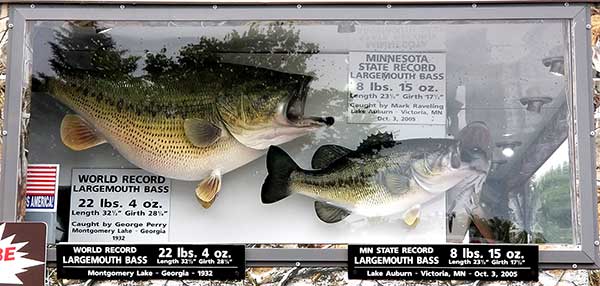Bass are found throughout the lower 48 states, Canada, Mexico and parts of Cuba. They will eat most anything that gets in there way, and are fairly easy to catch. Even though they are not the biggest fish out there, they put up a big fight, and will often break the surface with some acrobatic displays. Here are a few things you might be wondering about bass.
How Long do Bass Live
Bass seem to live longer in the north, up to 15 years, but don’t get as big as their counterparts in the south which only live about 11 years. Just like all wild creatures, the environment greatly affects the age and growth rate of bass. Factors such as water temperature, available food, angling pressure, predator abundance, water levels and vegetation will affect how long a bass lives. These factors vary from lake to lake and state to state, so getting an exact number is tricky.
How Fast do Bass Grow
If there is adequate food available, bass can grow up to 2 pounds the first year, but normal growth is 1/2 pound a year. Females grow bigger than males. In the northern regions, the females can get up to 10 pounds, while the males seldom get bigger than 5 pounds.
Bass Length to Weight Conversion
Have you ever caught a trophy bass, but forgot your scale? No need to worry, you can estimate the weight based upon the length of the fish. Keep in mind, this is a standard weight to length chart which will give you the size of an average fish. There are more specific formulas that factor in girth as well.
| Largemouth Bass | |
| 12 in | 0.90 lb |
| 13 in | 1.16 lb |
| 14 in | 1.47 lb |
| 15 in | 1.83 lb |
| 16 in | 2.25 lb |
| 17 in | 2.73 lb |
| 18 in | 3.28 lb |
| 19 in | 3.89 lb |
| 20 in | 4.59 lb |
| 21 in | 5.36 lb |
| 22 in | 6.22 lb |
| 23 in | 7.17 lb |
| 24 in | 8.21 lb |
How Long Can Bass Live Out of Water
This seems to be a highly debated topic with a wide range of answers. I’ve heard answers anywhere from the length you can hold your breath to 10 minutes, but these are mainly opinions from the experiences fishermen have had. You don’t really know for sure unless you do a scientific study on the matter. I just so happened to run across study that did just that. Here is what I found. In the first study, bass were exercised to simulate being caught. Then they were held out of the water by their bottom lip, like most anglers do, for varied amounts of time up to 10 minutes. They were then placed back in a tank and monitored for 24 hours. The largemouth recovered faster than the smallmouth, but there were no documented mortality cases after 24 hours.
In a second test, the bass were angled out of the lake, then held out of water for varying times up to 15 minutes before being released into a holding tank for 30 minutes. While in the tank they were fitted with transmitters and then released back into the wild. They were monitored for 5 days. Once again, all fish survived, even after being held for 15 minutes out of water! The longer they were held out of water, the longer it took the fish to recover and leave the area it was released in. So length out of water did correlate with recovery times, but all fish did survive.
One important factor to keep in mind is that this test was conducted in water temps of 75 degrees and less. 75 degrees seems to be a dividing line for fish mortality. The warmer the water is, the higher the chances a fish won’t survive.
What is the Biggest Bass Ever Caught
I was walking through the Minnesota state fair when I came across a booth that had the world record bass. It is 22 lbs 4 oz, caught by George Perry in 1932, on Montgomery Lake, Georgia. Next to it was the Minnesota state record at only 8 lbs 15 oz, caught on Lake Auburn in Victoria, MN. This just proves, as I mentioned above, that fish in the south grow bigger. I’m assuming it’s just a replica, but it gives us a good visual on just how big a 22 lb bass is, and how tiny it makes an 8 lb bass look.

Do Bass Have Teeth
Yes, bass have teeth. You might not even notice unless you take a close look. They have numerous, very small, but sharp little teeth. They are small enough that they usually don’t pose any risk to us humans, unless you catch so many bass that you get bass thumb. Most bass fishermen hold bass by the lower lip with their thumb on the inside of the mouth. All those tiny teeth will eventually scuff up your thumb as if you rubbed it against some course sandpaper. Now a word about proper bass handling. Yes, holding them by the lip is the preferred method, but the angle you hold them at is crucial. You can either hold them vertically, or if you choose to hold them horizontally, don’t let their body droop more than 10 degrees. Putting one hand under their belly can help support its weight and put less stress on its mouth. The bigger a bass gets, the the more it will benefit from using a second hand.
Can You Eat Bass
Are bass edible? Yes, they are definitely edible. The real question is: Do you like eating bass? This one comes down to personal taste. I personally never liked the taste of bass. I feel they are a soft mushy flesh compared to your better eating fish. On the other hand, my dad yells at me every time I throw one back. My mom who is not a big fan of eating fish, now says bass are her favorite. It turns out they found a recipe which they both love and I have to admit, it’s pretty good. They actually have two ways of cooking bass. I’ll do my best to relay the information they gave me.
Recipe #1
Filet the bass so there is no skin on it. Then boil a pot of water and add a small amount of salt to it. Maybe a teaspoon or less. It only takes about 3 minutes of cooking and its done. Put the filet on a plate and cover it in some melted butter and top with parsley and a little paprika.
Recipe #2
Similar to the first recipe, but instead of boiling in salt water, you put it on a baking sheet and throw it in the oven. Season it with melted better, garlic salt, seasoning salt, lemon pepper, and paprika. Use one or all the seasoning and put on as much as you like.
The above pertains to largemouth bass. I’ve eaten smallmouth bass several times and I think they are very good eating. I usually catch smallmouth bass when doing a fishing trip down the St. Croix river. We stop halfway down and have a shore lunch on the riverbank. We fry them up in a cast iron pan over a fire, and serve them with some fried potatoes and coleslaw. Maybe I associate it with such a wonderful experience, but that’s some of the best fish I ever had.
Sean from ontrackfishing.com has also written an article about eating bass. Check out his article here.
Do Bass See Color
Yes, bass see color. They have a cell structure similar to humans with rods and cones. To put it simply, cones are used in the daylight to see color, and rods take over in low light conditions and see in black and white. Bass eyes have more rods than a human, therefore can see better in the dark than us. Humans see through the air, while bass see through water. Color is a product of light, and light travels differently through water than it does in the air. Light is both absorbed and refracted by water. The shorter the wavelength, the deeper a color can penetrate the water. In clear water, the blue end of the spectrum is visible at the deepest depths, while the red end is absorbed more quickly. Bass tend to spend a lot of time in shallow water, so most of the color spectrum is visible to them, so the color bait you choose might make a difference. Light behaves differently in muddy or algae filled water. In this case you will want to use a lure that contrasts with the surrounding water.
Ice Fishing for Bass
Many anglers feel that bass quit biting once the temps fall below 50 degrees. While their metabolism does slow down, bass still feed in the wintertime. Bass tend to congregate in the winter because their habitat dwindles. Many of the weeds die off, so they will be around the few weeds remaining, or looking for other types of structure to hang out by. If you can’s find any weed lines, look for sharp breaks that come out of deeper water. I don’t intentionally fish for bass through the ice, but I will pull some up occasionally while jigging for panfish, or even catch some on a tip-up. If I catch one, I usually catch several, which confirms that they congregate close together in the wintertime.
